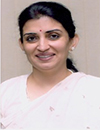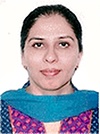Global Environmental Health

Air Pollution, Climate Change, and Health in India (Part I)
December 21, 2017
Experts: Sujata Saunik, Meena Sehgal
In this two-part podcast series, we take a look at how innovative partnerships and community engagement approaches are helping to build capacity and empower communities in India to take active roles in addressing their environmental and health concerns. We will also hear about how NIEHS as formed partnerships in India, with the goal of addressing these challenges and improving public health.
(Editorial credit: leshiy985 / Shutterstock.com)
In this two-part podcast series, we take a look at how innovative partnerships and community engagement approaches are helping to build capacity and empower communities in India to take active roles in addressing their environmental and health concerns. We will also hear about how NIEHS as formed partnerships in India, with the goal of addressing these challenges and improving public health.
Like many developing countries, India faces many adverse impacts from climate change and poor air quality, which present significant challenges for public health. For example, poor air quality is known to be linked with cardiovascular and respiratory diseases. Changes in climate can influence temperature, precipitation patterns, and air quality, which can increase the incidence of vector-borne diseases, heat stress, and cardiovascular and respiratory diseases, as well as increase food insecurity through impacts on agriculture.
Part 1: Local Perspective

Sujata Saunik serves as the Principal Secretary of Financial Reforms and is the former Principal Secretary of the Public Health and Family Welfare Department for the Government of Maharashtra, India. She has Master’s degrees in Public Administration and Social Sciences. She is currently a Takemi Fellow at the T.H. Chan School of Public Health at Harvard University.
Saunik leads state projects on designing governing architectures and policy frameworks for effective, transparent, and seamless disbursement of funds and tracking expenditures against department‐specific outcome indicators, enabling higher fiscal efficacy. She has also worked on multiple projects that involve community health. These projects include efforts to improve sanitation and hygiene, remove plastic waste in community villages, and provide safe drinking water in poor communities. Saunik also has research experience in topics such as public health management and child and infant mortality.

Meena Sehgal is as an epidemiologist and data analyst with The Energy Resources Institute (TERI). She has Master’s degrees in Public Health and Biostatistics from Emory University. Sehgal has 22 years of experience in data analysis, processing, and interpretation.
Sehgal leads a team of research professionals working on environmental assessments and evaluating human health effects. Her areas of focus include climate sensitive health risks and emerging issues of urban development and human health. Sehgal has published research on ozone pollution and its health effects in India. She also works with Understanding Climate and Health Associations in India (UCHAI) to understand and access risk of urban environmental contaminants in India.
Other Episodes in the Same Series


